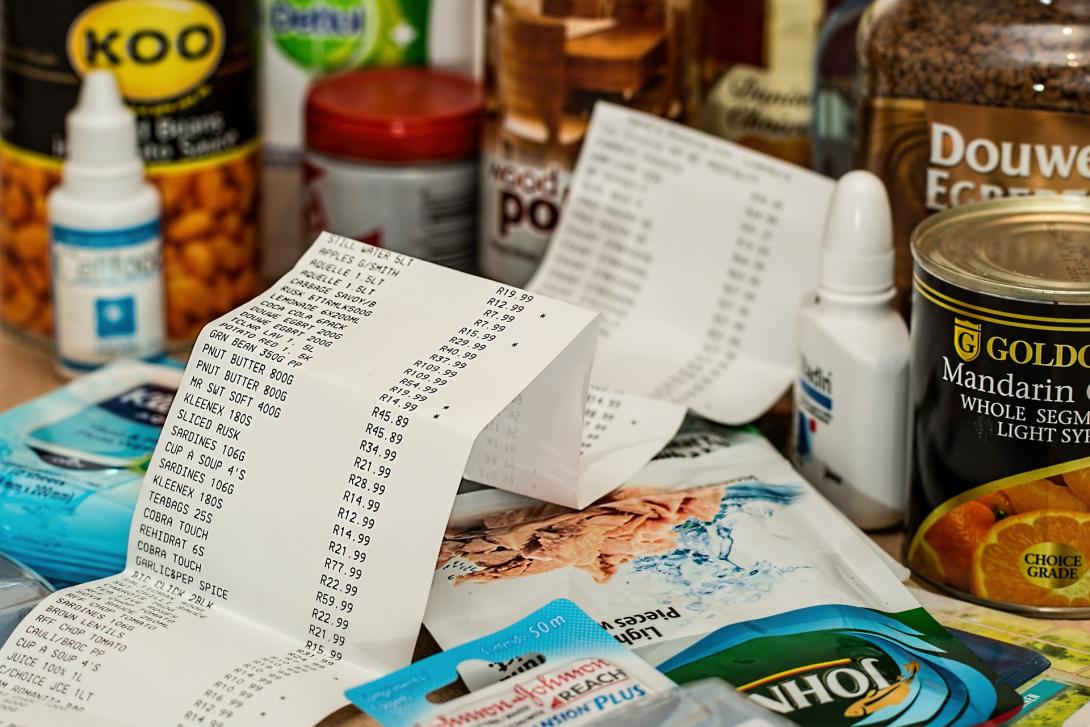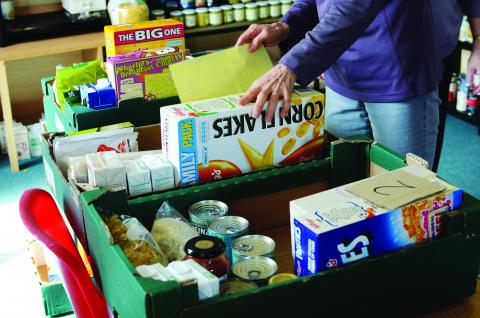16 November 2022
Food Prices Nov-22 Update: What are retailers doing to help?

by Shona Goudie
Food prices continue to rise sharply forcing people to change their purchasing habits
Food inflation continues to rise at a worrying rate, skyrocketing to 16.4% in October 2022 from 14.6% the previous month according to data from the Office for National Statistics. This remains markedly higher than overall inflation which is sitting at 11.1%.
The ONS calculation for food inflation is based on a collection of products that are not necessarily indicative of what might be typically purchased on a weekly basis or a nutritionally adequate diet. To add insight on how a reasonable weekly shop may be affected by inflationary pressures, The Food Foundation’s Basic Basket Tracker measures weekly price changes of shopping baskets of food that the average man and woman could typically eat as part of a reasonably costed, adequately nutritious diet (see FAQs for further details). Since we began tracking in April, the price of the man's basket has increased by approximately 16% (when taking clubcard prices in to account), a similar level to overall inflation but in a much shorter time period.
People are increasingly feeling the pressure of rising prices, driving them to change their purchasing habits as a result. Sales of own-label ranges have risen 42% (some of which will be due to increased prices rather than increased volume sales) while in contrast, branded products sales only rose by 0.4% likely indicating a big drop in the volume being purchased. Volumes of vegetables sold fell by over 6%, while sales of snacks and candy rose by almost 4% indicating that the nutritional quality of purchases is also being affected. This move away from healthy foods is no surprise considering that on average they are three times more expensive than less healthy foods per calorie. If these trends continue, this could have serious ramifications for the long-term health of the nation. Both government and the food industry have a significant responsibility in preventing this.
What are retailers doing to help with food prices and food insecurity?
Food businesses have a critical role to play in supporting customers through the cost of living crisis. There are many external pressures on the food supply chain at this time including increased agricultural input costs (such as animal feed and fertilisers), increased energy costs and increased labour costs to name a few. While retailers are endeavouring to keep prices down, particularly in light of tight market competition, they are unable to completely prevent these costs being passed through to the customer. However, many of them recognise that this is leaving people on the lowest incomes unable to eat and are committed to doing their part to support these people through this difficult economic period. Here we explore some of the excellent steps that retailers are taking and what more needs to be done to ensure no one is left to go hungry or priced out of a healthy diet.
Supporting the Feed the Future Campaign
This week, several of the biggest retailers in the UK added their support to the Feed the Future Campaign. In a letter to the Secretary of State for Education, Gillian Keegan, they express their commitment to supporting families through the cost of living crisis, many of whom they say are at breaking point. But they rightly point out that they cannot do this alone and call on Government to do their part by expanding the Free School Meals scheme to all children on Universal Credit to protect children from food insecurity. It’s fantastic to see the food industry adding their voice to that of many charities, health professionals, education professionals and celebrities in calling for this critical intervention.
“As food retailers, we witness first-hand the daily struggles our customers face to feed their families.” Letter from Business Leaders to Gillian Keegan, November 2022
School Holiday Café Deals
School holidays can bring added financial pressures for parents, such as reduced income due to childcare responsibilities limiting their ability to work, or having to pay for childcare, as well as increased expenditure on activities and food for their children. For children who usually receive Free School Meals during term time, some help is available through the government’s Holiday Activities and Food (HAF) Programme but it is not available every day of the school holidays throughout the year and these gaps leave families with no government support with feeding their children during those times.
However, in the October half-term when the majority of HAF programmes do not run, several retailers made the move to provide discounted meals for children from their cafes. For example, Asda offered a deal where children could eat for £1 at any time of day. Some schemes also incentivised fruit consumption: Tesco offered a deal where buying a piece of fruit worth 60p allowed theme to receive a free child’s meal worth up to £3.25; and Marks and Spencer’s and Morrisons' cafes both offered a free children’s meal deal including a piece of fruit when £5 was spent on adult food or drink. Creating affordable meals for children can make a big difference towards helping prevent holiday hunger. To improve on this even further, retailers must ensure that these meals are guaranteed to be healthy meals that will provide children with the nutrients they need to thrive.
Offering microloans to customers for buying food
Going into debt is quickly becoming many families only option to cover the costs of the bare essentials. A quarter of adults have less than £100 in savings (17% have no savings at all), with 36% say they are relying on savings to get through this period of high prices. This sparks serious concerns that more and more people will be forced into borrowing money with high interest rates that they will struggle to pay back in order to afford energy and food in the coming months. Already, 1.8 million households are in debt on their gas bills, 2.3 million are in debt on electricity bills and a reported 14% have had to borrow money in order to afford their regular food bills in the past year.
To help with the issue of borrowing money to afford food, Iceland are offering interest free loans up to the value of £100 to help customers manage their finances and cope with rising food prices. The loans can only be spent in Iceland (and The Food Warehouse) stores and a repayment plan is set up at £10 a week. The loans should not be relied on as a permanent solution to food insecurity and so the scheme availability is limited to six school holiday windows throughout the year to help low income families struggling with the added pressures during that time. An independent review of a trial of this scheme found that 95% of participants found it helpful and 92% were able to reduce their use of foodbanks, a much less dignified approach to food provision.
Adding Value to the Healthy Start Scheme
The Healthy Starts Scheme aims to boost the dietary health of low-income pregnant women and children under four, by providing funds that can be spent on fruit, veg, formula, cows' milk and pulses. All major retailers accept Healthy Start payments. During the pandemic, many retailers added value to the scheme which at the time operated on a paper voucher system. Since then, it has moved over to a digital card which - while potentially having many positives - has led to technical difficulties preventing retailers from being able to add value. However, we are delighted that Sainsbury’s have now cracked the problem and have re-introduced giving Sainsbury’s customers who use a Healthy Start card a coupon worth £2 to spend on fruit and vegetables during their next shop. When this ran during the pandemic, the £2 coupon increased purchases of fruit and veg by 13 portions per basket compared to those that didn’t. This is a significant step towards removing the affordability barrier that many low-income families face in accessing healthy food. Many other retailers added value to Healthy Start during the pandemic and we hope to see others re-introducing these initiatives in the coming months. Iceland are also promoting the Healthy Start Scheme by advertising it on all their own brand milk bottles and fruit and veg packs to help raise awareness of the scheme for those who are eligible but not signed up.
"It’s brilliant to see Sainsbury’s supporting their customers to access a healthy diet. We know that good nutrition during the first few years of life is critical for healthy growth and development, so it would be great to see other retailers follow Sainsbury's lead and support Healthy Start – either through value add offers or through promoting the scheme to their customers." Rebecca Tobi, senior business and investor engagement manager at The Food Foundation
Supporting the over 60s
At the other end of the age spectrum, retailers are also supporting pensioners. Asda have launched a £1 winter warmer deal providing soup, a roll and unlimited tea and coffee for over 60s throughout November and December, and Iceland are offering a 10% discount to over 60s on Tuesdays to help with the cost of their weekly shop.
Offering promotions to keep prices down
While we appreciate that retailers are endeavouring to offer their customers good deals, it is incredibly important that they are offering these on healthy food, not making highly processed foods that are high in fat, salt and sugar even cheaper. These foods while satiating hunger in the short term contribute to longterm health problems including obesity, type 2 diabetes and heart disease.
Iceland’s £1 range offers deals for customers on a number of staple foods, fruits and vegetables which will greatly help families afford these core foods. Unfortunately, Iceland’s £1 range includes a number of less healthy foods, as does Tesco’s “5 for 4” offer on their frozen range despite pledging not to put HFSS foods on promotion. Instead of making unhealthy foods even cheaper, retailers should be focusing making healthy foods more affordable and rebalancing the cost of the basket to incentivise healthy eating.
Increasing wages for employees
Retailers are significant employers and so have a critical role in ensuring that their employees are paid enough to afford to eat themselves. Many retailers have increased wages in recent months for shopworkers and distribution staff. Lidl and Aldi are currently paying the highest national rate at £10.90 (the real living wage) and £11.00 respectively UK wide, and £11.95 and £12.45 respectively in London. Aldi have committed to further pay increases in the new year. All the other retailers pay less than the living wage, but do offer other benefits such as staff discounts on food or discounted/free meals to support staff, and paid breaks (only Aldi and Co-op). We strongly encourage all retailers to pay their staff enough to put food on the table for their families, as well as keep themselves healthy enough to work.
These are just a handful of examples of the great steps being taken by retailers to help their customers through the cost of living crisis. The financial pressures on low-income families are likely to get even greater over the winter. Food inflation is predicted to rise even more, and further squeezing of food budgets will be required due to increased need for expenditure elsewhere, such as heating bills as the temperature drops. Retailer action is by no means a substitution for government intervention, but rather a complementary necessity – both are essential to preventing food insecurity in this country from escalating even further.
We therefore look forward to seeing retailers doing more in the coming months, as committed to in the letter this week to the Education Secretary of State. This week, consumer group Which? launched a 10 point action plan of recommendations to advise supermarkets where to target their efforts in the coming months to ensure maximum benefit. Importantly, retailers must not only help customers to buy food, but to buy high nutritional quality food that will positively benefit their health in the long-term, not merely fill their stomachs in the short-term. Increasing the availability of low-cost healthier options and ensuring there is no trade-off between health and choosing a cheaper option are both areas where we hope to see greater action being taken.

Shona joined The Food Foundation as a Project Officer in 2019 and has worked on research, policy and advocacy across a range of projects over that time including leading our food insecurity surveys and flagship annual Broken Plate reports. She now works across the charity's policy portfolio including our children's food campaigns, food insecurity and food environments. She is a Registered Associate Nutritionist with a background in clinical nutrition who worked in dietetic departments in NHS hospitals before joining The Food Foundation.

Indu joined The Food Foundation in 2019 as part of the Rank Foundation’s Time to Shine scheme, moving into a Project Officer role in 2020. She works on the Peas Please and Plating up Progress projects. Prior to joining The Food Foundation, Indu completed a MSc in Public Health and a BSc in Human Nutrition. She is interested in reducing health inequalities, children’s health and wellbeing, and sustainable and nutritious food system/diets. Indu is also a lover of veg, having recently taken up urban gardening.





